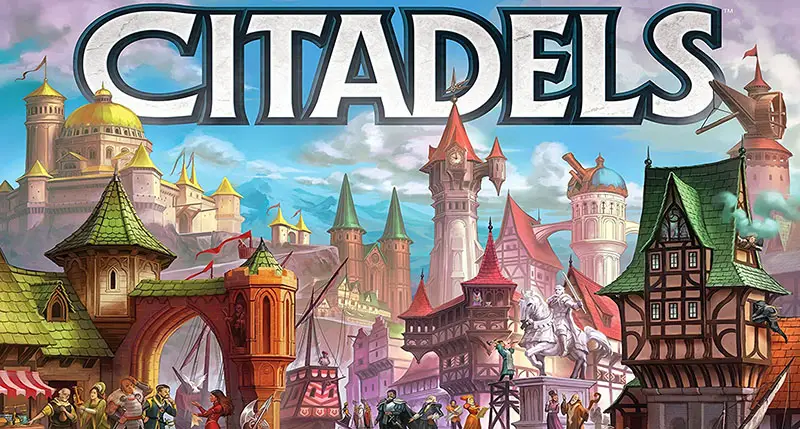
In Citadels, players are vying to become the kingdom's next Master Builder by constructing the most impressive medieval city. To do so, players must acquire gold and enlist the services of a diverse cast of characters.
During a round, each player chooses one character, who provides a special ability for that turn. Each player builds his own city by playing district cards from his hand, which at the end of the game are worth points equal to their cost.
The game ends at the end of the round in which a player has seven districts in his city, and the player with the most points will become the kingdom's next Master Builder!
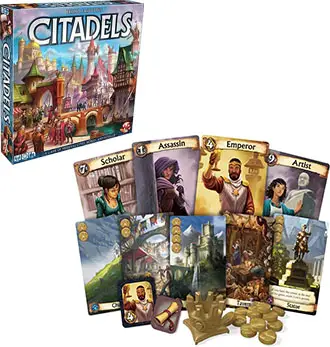
Components
- 27 character tokens
- 1 plastic crown
- 30 plastic gold coins
- 27 character cards
- 3 warrant markers
- 6 reference cards
- 2 threat markers
- 11 religious district cards
- 11 military district cards
- 12 noble district cards
- 20 trade district cards
- 30 unique district cards
A Brief History of Citadels
Citadels was first released back in the year 2000, and it is widely considered to be one of the great card games of the modern era.
Its success led to an expansion a few years later, and over the last decade and a half the game has been published in 25 languages and packaged in boxes of all shapes and sizes.
This definitive edition of the game includes characters and unique districts from both the base game and the expansion, as well as a brand new cast of 9 characters and 12 completely new unique districts, offering more gameplay options than ever before.
Setup - First Game
For your first game, set aside the cards listed below and all 54 district cards with these icons in the bottom-left corner:

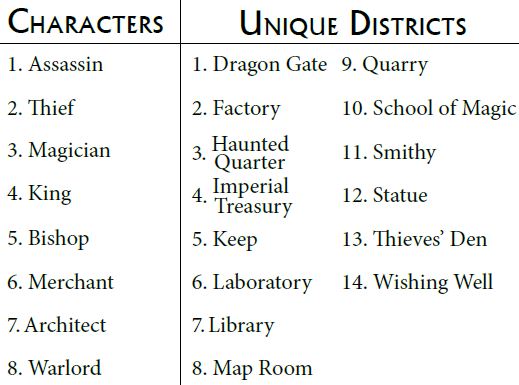
All other cards will not be used for your first game.
The setup steps presented here are for your first game only. For the complete steps of setup for future games, see "Complete Setup" on the back cover of the rulebook.
To set up your first game, follow these steps:
-
Take the character tokens matching the eight characters from the list on the left and place them in the center of the table in order of rank. These tokens act as a reminder of which characters are being used this game.
-
Take the 14 unique district cards from the list on the left and shuffle them with the 54 basic districts. Deal four cards facedown to each player. These cards are the players' starting hands.
-
Place the remaining district cards in a facedown pile in the center of the table to create the district deck; then create the bank by placing all gold coins in the center of the table.
-
Each player takes two gold from the bank. This gold belongs to the player and stays in his personal stash until he uses it.
-
The oldest player takes the crown and the eight character cards from the list on the left.
Setup Diagram (6-player Game):
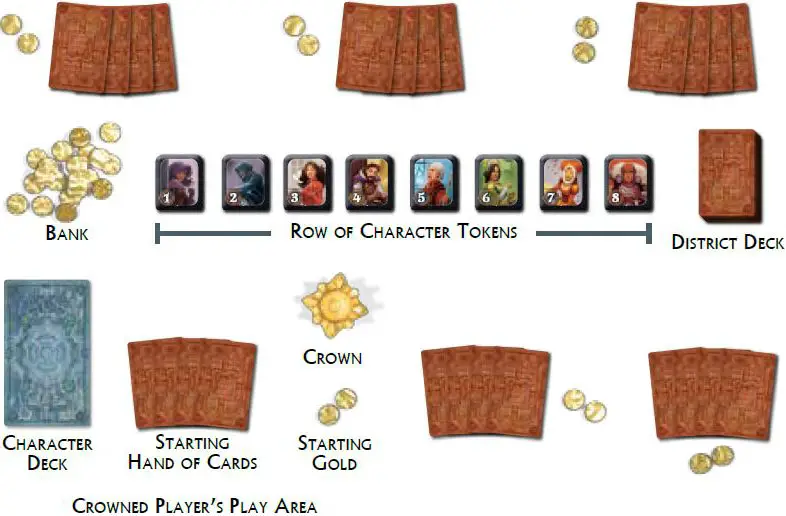
Game Play
Citadels is played over a series of rounds. Each round begins with the selection phase, during which players pass around the character cards and choose one character for the round.
Each character card has special abilities, such as stealing another player's gold or destroying another player's district. After the selection phase comes to the turn phase, during which players gather resources and build new districts in their city.
The player with the crown is known as the crowned player, who makes sure that each step is followed in order and calls for each character to take his turn during the turn phase.
Selection Phase
The crowned player gathers the deck of character cards and shuffles them. First, he randomly discards a number of them faceup in the center of the table, and then he randomly discards one facedown.
The number of discarded faceup cards depends on the number of players in the game (see the table below). Discarded cards are not used this round.
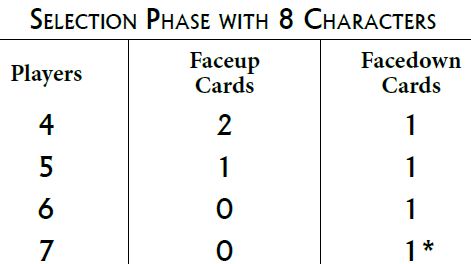
(*) Special Rule with 7 Players: After the sixth player passes the last character card to the seventh player, the seventh player also takes the character card that was discarded facedown at the beginning of the round.
He chooses one of these two characters and discards the other facedown.
Important: The rank 4 character (King, Emperor, or Patrician) cannot be among the faceup discarded cards. If it is discarded faceup, discard another character card faceup to replace it and shuffle it into the character deck.
Next, the crowned player takes the remaining character cards, looks at them, and secretly chooses one to keep. Then he passes the remaining cards to the player on his left, who also chooses a card and passes the rest of the cards to his left, and so on.
This continues until each player has chosen one character card. After the last player has chosen his card, he discards the one unchosen card facedown near the other discarded cards.
Turn Phase
Unlike the selection phase, players do not take turns in clockwise order during the turn phase. Instead, they take turns in ascending order of their chosen character's rank, which appears in the top-left corner of each character card.

The crowned player calls each character number in ascending order, starting with the number "1" (the Assassin, Witch, or Magistrate). If a player has the called character card, he reveals it by flipping it faceup and takes his turn.
During a turn, the player must gather resources. He can either take two gold from the bank or draw two district cards from the deck, choose one to keep, and discard the other facedown to the bottom of the deck.

After gathering resources, he may build one district in his city. To do this, he plays a card from his hand faceup in front of him and pays gold to the bank equal to the district's building cost.
A player has a building limit of one district per turn, and a player cannot build a district that is identical (with the same name) to a district already in his city.
After the player who revealed the called character has taken his turn, or if no player revealed the called character, the crowned player continues calling the next character in ascending order, and so on until he has called all characters, after which a new round begins with the selection phase.
Character Abilities
A player may use his character's abilities only once per turn at the time specified. If no time is specified, the player can use the ability at any time during his turn. Some characters have abilities that gain resources for districts of a certain type in their city.
These abilities can award either gold or cards, as specified in each character's ability. As a reminder, these characters' rank number appears on a gem of the color of the corresponding district type.
Character abilities are the heart of the game, so be sure to familiarize yourself with them before the game begins.
Districts
There are five district types, which are indicated by the colors and icons shown below. District types are referenced by some character abilities and some effects that score points at the end of the game.

Each unique district has an effect, which is described on its card. These effects can do a variety of things, such as gain you more resources of a certain type or provide extra points at the end of the game. District effects are optional unless the word "must" or "cannot" is used.
Example of a Turn:
Kurt just finished his turn as the Architect. The next character called is the Warlord. Ashley chose the Warlord during the selection phase, so she flips her character card faceup and takes her turn.
-
Earlier in the round, Anna was the Thief and chose to rob the Warlord. Now that the Warlord is revealed, Anna takes all the gold in Ashley's stash.

-
Next, Ashley gathers resources. To try and recuperate a portion of her stolen coins, she chooses to gain two gold from the bank.

-
Kurt appears to be in the lead, so Ashley decides to pay one gold to destroy his Market, which he discards facedown to the bottom of the deck.
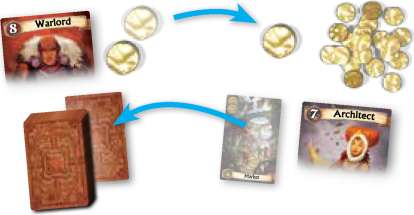
-
Now she chooses to gain gold for her military districts. She has a Prison and the School of Magic, which she can count here as a military district, so she gains two more gold from the bank. She now has three gold in her stash.
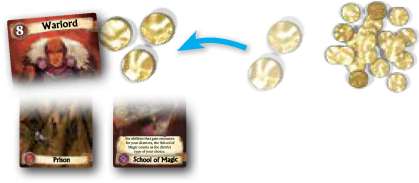
-
She pays three gold to build a Barracks, placing it in her city next to her other districts. She has already used her character ability to gain gold, so she does not gain gold this turn for her Barracks.
Since she has used her abilities and built her one district for the turn, her turn ends.
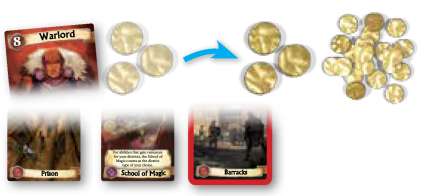
The Warlord was the last character in the round, so this round is over. The crowned player gathers all character cards to shuffle them and prepare for the next selection phase.
Open Information
The number of gold in a player's stash and the number of cards in a player's hand are open information.
There is an unlimited amount of gold. If the bank runs out of gold, players can use a substitute for gold, such as a coin. Also, there is no limit to a player's handsize.
End of the Game
As soon as a city has seven districts, it has been completed; the game will end after the current round is finished. A city can have more than seven districts.
When the game ends, players score points as follows:
- Score points equal to the building cost of each of your districts.
- If your city has at least one district of each type, score 3 points.
- The player who first completed his city scores 4 points.
- Any other player who completed his city scores 2 points.
- Score any extra points from your unique districts.
Players compare point totals, and the player with the most points wins.
If there is a tie, the tied player who revealed the character with the highest-numbered rank during the last round wins.
Playing with 2-3 Players
In 2- or 3-player games, each player plays with two characters. The game is played normally, except that each player takes two turns each round (one turn for each character).
Each player has only one stash of gold and one city, and each character's abilities apply only during its own turn.
For example, a player with both the Architect and the Warlord can save a district drawn during his Architect turn to build later that round during his Warlord turn. Also, the Architect's ability to build more than one district does not apply during his Warlord turn.
2- Player Rule Changes
Setup
The character deck includes characters rank 1-8 (the Emperor cannot be used in 2-player games).
Selection Phase
The crowned player gathers the deck of character cards and shuffles them. He randomly discards one card facedown in the center of the table. Then he takes the remaining seven cards, secretly chooses one to keep for himself, and passes the remaining six cards to his opponent.
For the remaining selections this round, each player chooses two character cards: one he keeps, the other he discards facedown near the other discarded cards, and then he passes the remaining cards to his opponent. This continues until there are no more characters remaining.
End of the Game
As soon as a city has eight districts, it has been completed; the game will end after the current round is finished.
3- Player Rule Changes
Setup
The character deck includes characters rank 1-9.
Selection Phase
The crowned player gathers the deck of character cards and shuffles them. He randomly discards one card facedown in the center of the table.
Then he takes the remaining eight cards, secretly chooses one to keep for himself, and passes the remaining seven cards to the player on his left, who chooses a card and passes the remaining six cards to the player on his left, who also chooses a card.
Now, after each player has chosen one card, the third player randomly discards one of the remaining five cards facedown near the other discarded card. Then he passes the four remaining cards to the crowned player.
Each player in turn chooses a second character card, and the last unchosen card is discarded facedown near the other discarded cards.
End of the Game
As soon as a city has eight districts, it has been completed; the game will end after the current round is finished.
Customization Rules
After you have played the basic game, you can add more variety to the game by playing with different characters and unique districts.
Alternatively, players can choose which characters and unique districts to use in the game by following the customization rules below.
Before the game begins, choose a cast of eight characters, one for each rank from 1 to 8. These will be the characters used this game; return all other character cards to the game box.
Also before the game begins, choose 14 unique districts of varying building costs to use this game. Prepare the district deck by shuffling the chosen unique districts with the 54 basic districts. Then return the unused unique districts to the game box.
For the complete steps of setup, see "Complete Setup" on the back cover of the rulebook.
Using 9 Characters
Using the rank 9 character is required in games with 3 or 8 players, and is optional with 4-7 players. The Queen cannot be used in games with fewer than 5 players.
selection Phase with 9 characters
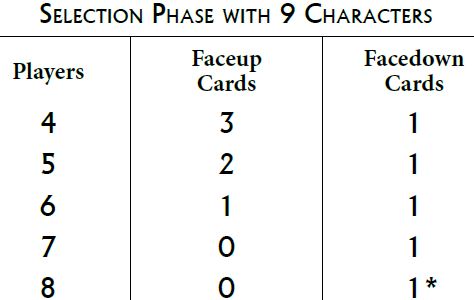
(*) When playing with 8 players, the "special rule with 7 players" applies to the eighth player.
Character Abilities in Detail
This section explains each character's abilities in full detail. Remember, character abilities are optional (unless the word "must" or "cannot" is used here in the rules), and each ability can be used only once per turn at the time specified.
If no time is specified, the ability can be used at any time during your turn. This also includes abilities that gain resources for districts in your city.
For example, if you are the Bishop, you might choose to gain gold before building a new district (if you need the gold to build that district) or after building (to gain gold from a newly built religious district).
Assassin

Call the name of another character whom you wish to kill. When the killed character is called to take his turn, he must remain silent and skip his entire turn for this round without revealing his character card.
Witch

First you must gather resources, then you must call the name of another character whom you wish to bewitch, and then your turn is put on hold. You cannot build at this time, and the only district effects you can use are those that occur when gathering resources (Gold Mine, Library, or Observatory).
When the bewitched character is called to take his turn, he gathers resources and his turn immediately ends. He cannot build a district or use any of his character's abilities-not even those that provide "extra" resources (like the Merchant's extra gold). The only district effects that the bewitched player can use are those that occur when gathering resources.
Now you resume your turn as if you were playing the bewitched character; you use that character's abilities, including those that provide extra resources, passive abilities (such as the Bishop's protection against rank 8 characters or the Architect's increased building limit), and restrictions (such as the Navigator's inability to build districts).
You play with the cards in your hand, pay with the gold in your stash, gain resources from districts in your city, and build new districts in your city. You cannot use effects from unique districts owned by the bewitched player.
If the Blackmailer is bewitched, you assign threat markers, receive bribes from threatened players, and choose to reveal the threat marker if the targeted player does not pay.
If the King or Patrician is bewitched, he still takes the crown. If the Emperor is bewitched, you choose whom to give the crown to and take the resource from that player.
If the bewitched character is not in play this round, you do not resume your turn.
Magistrate

Take the three warrant markers and assign them facedown to three different character tokens of your choice. One of the markers shows the signed warrant on its face; only the player marked with the signed warrant is targeted.

If the targeted player pays to build a district during his turn, you may reveal his warrant marker by flipping it faceup. If you do, you confiscate that district from him and build it in your city instead for free.
The confiscated district never enters the targeted player's city, but it does count toward the targeted player's building limit for the turn. The targeted player receives back all gold paid for that district. If he is able to build more than one district during his turn, you can confiscate only the first district he pays to build.
Note: You cannot confiscate a district if you have an identical district (with the same name) already in your city.
Thief

Call the name of another character whom you wish to rob. When a player reveals that character to take his turn, you immediately take all of his gold.
You cannot rob the rank 1 character (Assassin, Witch, or Magistrate), the killed character, or the bewitched character.
Spy

Choose another player and name a district type (noble, religious, trade, military, or unique). Then look at the cards in that player's hand. For each card in his hand that matches the named district type, take one gold from that player's stash and gain one card from the deck.
If the player whose hand you looked at has more cards of matching districts than gold in his stash, you take all the gold in his stash, and you still gain cards for each of the matching districts.
Call a character you wish to rob. When the robbed character is revealed, you take all his gold.
Blackmailer

Take the two threat markers and assign them facedown to two different character tokens of your choice. One of the markers shows the flowered lace on its face; both players are threatened, but only the player marked with the flowered lace is targeted.

When a threatened player is called to take his turn, he must immediately gather resources and then resolve the threat: he can bribe you by giving you half his gold (rounded down), which removes his threat marker without revealing it.
A threatened player with only one gold in his stash can bribe you by giving you zero gold. If he does not bribe you, you may reveal his threat marker by flipping it faceup. If you reveal the flowered lace, you immediately take all his gold.
A threatened player must resolve the threat before he is able to use any of his character abilities or build districts, and the only district effects he can use before resolving the threat are those that occur when gathering resources (Gold Mine, Library, or Observatory).
You cannot assign threat markers to the rank 1 character (Assassin, Witch, or Magistrate), the killed character, or the bewitched character. You can assign threat markers to characters who have been assigned warrant markers.
Magician

You can do one of the following:
Exchange your entire hand of cards with another player's hand of cards; if you have zero cards in your hand, you simply take the other player's cards.
Discard any number of cards from your hand facedown to the bottom of the district deck to gain an equal number of cards from the district deck.
Wizard

Look at another player's hand of cards and choose one of those cards. Then either pay to immediately build the chosen card in your city or add it to your hand. If you immediately build it, it does not count toward your building limit, which means you can build another district this turn.
During this turn, you can build districts that are identical to any other district already in your city.
Seer

Take a card at random from each other player's hand and add those cards to your hand. Then give one card from your hand to each player you took a card from. If a player has no cards in hand, you neither take a card from him nor give him a card.
Taken cards can be kept and given back in several different combinations: you can give a player the exact same card back, you can give a card taken from one player to another, or you can keep a card taken and give back a card from your original hand.
Your building limit this turn is two.
King

You gain one gold for each noble district in your city.
At some point during your turn, you must take the crown. You are now the crowned player, so you call characters for the rest of the round, and you will be the first to choose a character during the next round (until another player chooses the King).
If you are killed, you skip your turn like any other character. At the end of the round, reveal the King's character card and take the crown as the King's heir.
If you are bewitched, you still take the crown.
Note: If the King is discarded faceup at the start of the selection phase, randomly discard another character card faceup to replace it and shuffle the King into the character deck.
Emperor

You gain one gold for each noble district in your city.
At some point during your turn, you must take the crown from the player who has it and give it to a different player, but not yourself. You take either one gold from his stash or one card at random from his hand. If he has neither gold in his stash nor cards in hand, you do not take anything.
If you are killed, you skip your turn like any other character. At the end of the round, reveal the Emperor's character card and, as the Emperor's advisor, take the crown from the player who has it and give it to a different player, but not yourself.
You do not take a resource from the new crowned player.
Note: If the Emperor is discarded faceup at the start of the selection phase, randomly discard another character card faceup to replace it and shuffle the Emperor into the character deck.
Note: The Emperor cannot be used in a 2-player game.
Patrician

You gain one card for each noble district in your city.
At some point during your turn, you must take the crown. You are now the crowned player, so you call characters for the rest of the round, and you will be the first to choose a character during the next round (until another player chooses the Patrician).
If you are killed, you skip your turn like any other character. At the end of the round, reveal the Patrician's character card and take the crown as the Patrician's heir.
If you are bewitched, you still take the crown.
Note: If the Patrician is discarded faceup at the start of the selection phase, randomly discard another character card faceup to replace it and shuffle the Patrician into the character deck.
Bishop

You gain one gold for each religious district in your city.
During this round, the rank 8 character (Warlord, Diplomat, or Marshal) cannot use its ability on your districts.
If you are killed, the rank 8 character can use its ability on your districts. Similarly, if you are bewitched, the rank 8 character cannot use its ability on the Witch's districts, but it can use its ability on the Bishop's districts.
Abbot

You gain either one gold or one card for each religious district in your city. You can choose any combination of the two resources.
For example, if you have three religious districts, you can use this ability to gain three gold and zero cards, two gold and one card, one gold and two cards, or zero gold and three cards. You must declare the combination of resources you wish to take before taking them.
If at any point during your turn you are not the player with the most gold, the richest player must give you one gold from his stash. If there is a tie for the richest player, choose which of the tied players must give you one of his gold. If you are among those tied for the richest player, you do not receive any gold.
Cardinal

You gain one card for each religious district in your city.
If you want to build a district, but you do not have enough gold to do so, you can take the remaining gold needed from one player.
For each gold you take, you must give that player one card from your hand. Then you must pay to build that district in your city.
A player cannot deny you his gold, and you cannot take more gold than is needed to build the intended district.
Merchant

You gain one gold for each trade district in your city. You gain one extra gold. You can use this ability regardless of which resource you gathered this turn.
Alchemist

At the end of your turn, you receive back all the gold you paid to build districts this turn, but not gold you paid for other reasons (such as the Smithy's effect or the Tax Collector's tax). This effectively means that you can build districts "for free", but only if you would have had enough gold to build them.
Trader

You gain one card for each religious district in your city.
Trade districts do not count toward your building limit this turn. This effectively means that you can build any number of trade districts in addition to your building limit.
Architect

Gain two extra cards. You can use this ability regardless of which resource you gathered this turn.
Your building limit this turn is three.
Navigator

You gain either four gold or four cards. You can use this ability regardless of which resource you gathered this turn.
You cannot build any districts during your turn - not even districts that do not count toward your building limit.
Scholar

Draw seven cards from the deck and choose one to add to your hand. Shuffle the other six cards back into the district deck and place it facedown in the center of the table.
Your building limit this turn is two.
Warlord

You gain one gold for each military district in your city. You can destroy one district of your choice by paying one fewer gold than its building cost. So, you can destroy a one-cost district for free, a two-cost district for one gold, a three-cost district for two gold, and so on.
You cannot destroy a district in a completed city, but you can destroy one of your own districts. Destroyed districts are discarded facedown to the bottom of the district deck.
Diplomat

You gain one gold for each military district in your city.
You can exchange one district in another player's city for one district in your city.
If the other player's district has a higher cost than your district, you must give that player the difference in gold from your stash. If your district has a higher cost than the other player's district, that player does not owe you any gold in return.
You cannot exchange for a district in a completed city nor for a district identical to a district already in your city, but you can exchange one of your districts if you have a completed city.
Also, the district coming from your city cannot be identical to a district already in the other player's city.
Marshal

You gain one gold for each military district in your city.
You can seize one district with a building cost of three or less in another player's city by giving the owner gold equal to its building cost. The seized district is added to your city.
You cannot seize a district in a completed city nor a district identical to a district already in your city.
Queen

If you are sitting next to the player who revealed the rank 4 character (King, Emperor, or Patrician), gain three gold. If this character is sitting next to you, but has been killed by the Assassin, you gain three gold when that card is revealed at the end of the round.
Note: The Queen cannot be used in games with fewer than five players.
Artist

You can beautify up to two of your districts by assigning them each one gold from your stash.
The cost of a beautified district is permanently increased by one, so a beautified district scores one more point at the end of the game, the Warlord must pay one more gold to destroy a beautified district, etc.
(keep the gold on the card as a reminder). A district can be beautified only once.
Tax Collector

When the Tax Collector is one of the characters in the game, players are charged a property tax for building districts.
Immediately after a player builds a district, he places one gold from his stash on the Tax Collector's character token. This applies even when a player builds a district that he has not paid to build.
If a player builds more than one district, he is charged the property tax for each district built. If a player has no gold remaining in his stash after building a district, he is not charged a tax. The Tax Collector himself is not charged a tax.
At any time during your turn, you can take all gold from the Tax Collector's character token into your stash.
Even if the Tax Collector does not appear during a round (because it was not chosen, it was discarded at the start of the selection phase, or it was killed by the Assassin), players are always charged a tax, and any gold left on the Tax Collector's token carries over to the next round.
In 2- and 3-player games, a player who chooses the Tax Collector as one of his characters is still charged a tax for his other character.
If the Magistrate confiscates a district from a player, the Magistrate is charged the tax, not his target.
District Clarifications
This section clarifies specific district card effects. Remember, district effects are optional unless the word "must" or "cannot" is used. Effects that are limited to "once per turn" can be used only during your turn.
Armory: A district in a completed city cannot be destroyed.
Capitol: The Capitol can score extra points only once.
Framework: The Magistrate cannot confiscate a district built by destroying the Framework, but the Magistrate can confiscate the next district the targeted player pays to build.
Great Wall: The Diplomat does not apply the Great Wall's effect to the district he is exchanging from his city.
Haunted Quarter: At the end of the game, if the Haunted Quarter's owner chooses to count its district type as anything other than unique, it no longer counts as unique.
Ivory Tower: If the Ivory Tower and Haunted Quarter are the only unique districts in a city and the owner chooses to count the Haunted Quarter as a district type other than unique, the owner scores extra points for the Ivory Tower.
Museum: If the Museum is exchanged or seized, assigned cards stay with the Museum. If the Museum is destroyed, assigned cards are discarded facedown to the bottom of the deck.
Necropolis: The Magistrate cannot confiscate the Necropolis if it is built without paying its cost, but the Magistrate can confiscate the next district the targeted player pays to build.
Park: If the owner is the Witch and does not resume his turn, the Park cannot resolve.
Poor House: If the owner is the Witch and does not resume his turn, the Poor House cannot resolve. If the owner is the Alchemist with zero gold at the end of his turn, he applies the Poor House's effect first before applying the Alchemist's ability.
Quarry: The owner can build any number of identical districts in his city, but he cannot use the Magistrate, Diplomat, or Marshal to acquire identical districts.
School of Magic: The Abbot gains one of either resource.
Stables: If confiscated by the Magistrate, the player can still build another district this turn.
Theater: The owner chooses who to exchange cards with, but he chooses blindly, without being able to look at anyone's character card. Exchanged character cards are not revealed until they are called during the turn phase, but the players involved in the exchange can look to see who their new character is.
In 2- and 3-player games, the owner chooses which of his two characters to give away and randomly chooses which of his opponent's characters to take in return.
Thieves' Den: If confiscated by the Magistrate, the owner receives back only gold spent, not cards.
Continue Reading

